Exploring Educators' Views on Professional Deficiencies in Education Quality Assessment
Received: 01/23/2022
Accepted: 04/05/2022
DOI: 10.11621/nicep.2022.0203
To cite this article:
Nikitin, I. V., Lavrenyuk, E. N. (2022). Exploring Educators' Views on Professional Deficiencies in Education Quality Assessment. New Ideas in Child and Educational Psychology, 2 (1-2), 30-48. DOI: 10.11621/nicep.2022.0203
Background. A growing body of research suggests that education practice and decision-making are driven by educators’ personalities, including their professional assumptions and beliefs. This paper addresses the issue of perception of educators’ limitations in their individual practice. The need for such a study has been brought up by the maturity of the focus of the professional network, which now questions the uniformity of the perceived practice limitations amongst its new and recurrent members.
Objective. This study aims to provide an outlook of the views of Russian-speaking educational assessment professionals from seven countries concerning what they perceive as their practice limitations. In so doing, it investigates the variation of the assumed professional deficiencies in the domain of professional practice among the study participants and the factors that might underlie such variation.
Design. The study employs a survey design to study the professional deficiencies in eight domains of professional practice. It uses an adapted Likert-type scale for estimating deficits in the assessment domains, complemented by open-ended questions to gather respondents’ comments and background items. The study’s sample is comprised of 234 educators from 7 countries (Russian Federation, Republic of Belarus, Republic of Kazakhstan, Kyrgyz Republic, Republic of Tajikistan, Republic of Armenia, Republic of Moldova).
Results. The study suggests that “Assessment of soft skills” is believed to be the most deficient domain, followed by “Best practices implementation”, although with a notable variation by the respondents’ country of residence. No significant variation by other background factors used in the survey, including respondents' employment, job role, and qualification, was established.
Conclusion. The study suggests some conclusions about diversity of views of the network participants on their practice. The variation of responses by countries of residence implies that national contexts impact which assessment professionals believe causes a deficiency in their practice. The results of the study might assist assessment authorities and agencies and network, including the ones working with educational assessment professionals from Russia and Russian-speaking countries.
Highlights- Russian-speaking educators believe “Assessment of soft skills” and “Best practices implementation” to be their most deficient domains of professional practice.
- In contrast, the domains “Monitorings / rankings” and “High stakes assessment” are seen by educators as the least deficient.
- No significant variations noted in participants’ responses caused by such factors as employment, type of practice, or qualification were established, although they were anticipated at the study design stage.
- The variation of responses by country of residence implies that national context factors which assessment professionals believe to be deficient in their practice.
Актуальность. Результаты исследований показывают, что личностные характеристики работников образования, включая их убеждения и установки, являются определяющими факторами при принятии практических и управленческих решений в этой сфере. Настоящее исследование направлено на выявление особенностей восприятия работниками образования собственных ограничений в профессиональной практике. Потребность в подобном исследовании связана с запросом профессиональной сети, находящейся в фокусе данной работы, на выявление сходств и различий в восприятии подобных ограничений среди своих участников.
Цель. Исследование направлено на выявление убеждений русско-говорящих профессионалов в области оценки качества образования из семи стран по поводу собственных профессиональных ограничений. С этой целью, в рамках исследования среди его участников изучается вариация предполагаемых профессиональных дефицитов, а также факторы, связанные с вариацией.
Дизайн. Исследование спроектировано как опрос, направленный на выявление профессиональных дефицитов в восьми доменах профессиональной практики. Для оценки выраженности дефицитов используется адаптированная шкала типа шкалы Лайкерта, а также вопросы открытого типа для сбора дополнительной информации и контекстных данных. Выборка составляет 234 специалиста в области образовании из семи стран (Российская Федерация, Республика Беларусь, Республика Казахстан, Кыргызская Республика, Республика Таджикистан, Республика Армения, Республика Молдова).
Результаты. По оценке участников опроса, наиболее выраженными являются профессиональные дефициты в домене "Оценка мягких навыков". За ними следуют дефициты в домене "Внедрение лучших практик", однако здесь наблюдается существенная вариация оценок в зависимости от страны проживания. Исследование не выявило вариации в оценке дефицитов по таким контекстным факторам, как место работы, должностные обязанности и квалификация респондента.
Вывод. В рамках исследования выявлены некоторые различия между участниками профессиональной сети в части их убеждений о собственной профессиональной практике. Вариация ответов респондентов в зависимости от страны проживания может свидетельствовать о связи между национальным контекстом и восприятием собственных профессиональных дефицитов. Результаты исследования могут представлять интерес для государственных органов, а также агентств и профессиональных организаций, работающих в области оценки качества образования, в том числе из России и русско-говорящих стран.
Ключевые положения- Русско-говорящие работники образования считают "Оценку мягких навыков" и "Внедрение лучших практик" наиболее дефицитными доменами в собственной профессиональной практике.
- "Мониторинги / рэнкинги" и "Оценивание с высокими ставками", напротив, воспринимаются как наименее дефицитные.
- Не обнаружено существенной вариации в содержании ответов респондентов в зависимости от таких факторов, как место работы, должностные обязанности и квалификация респондента, хотя наличие такой зависимости предполагалось на этапе планирования исследования.
- Обнаруженная вариация по странам проживания может свидетельствовать о влиянии национального контекста на убеждения специалистов в области оценки качества образования о профессиональных дефицитах
Introducción. Un creciente cuerpo de investigación sugiere que la práctica educativa y la toma de decisiones estén impulsadas por las personalidades de los educadores, incluidas sus suposiciones y creencias profesionales. Este artículo aborda la cuestión de la percepción de las limitaciones de los educadores en su práctica individual. La necesidad de este estudio ha surgido por la madurez del enfoque de la red profesional, que ahora cuestiona la uniformidad de las limitaciones de práctica percibidas entre sus miembros nuevos y recurrentes.
Objetivo. El presente estudio tiene como objetivo proporcionar una perspectiva de los puntos de vista de los profesionales de evaluación educativa de habla rusa de siete países con respecto a lo que perciben como limitaciones de su práctica. Al hacerlo, investiga la variación de las supuestas deficiencias profesionales en el dominio de la práctica profesional entre los participantes del estudio y los factores que podrían subyacer a dicha variación.
Diseño. El estudio emplea el diseño de encuesta para estudiar las deficiencias profesionales en ocho dominios de la práctica profesional. Utiliza una escala tipo Likert adaptada para estimar los déficits en los dominios de evaluación, complementada con preguntas abiertas para recopilar los comentarios y antecedentes de los encuestados. La muestra del estudio está compuesta por 234 educadores de siete países (Federación de Rusia, República de Bielorrusia, República de Kazajistán, República Kirguisa, República de Tayikistán, República de Armenia, y República de Moldavia).
Resultados. El estudio sugiere que la “Evaluación de habilidades blandas” se cree el dominio más deficiente, seguido de la “Implementación de mejores prácticas”, aunque con una variación significativa, según el país de residencia de los encuestados. No se estableció ninguna variación significativa por otros factores de antecedentes utilizados en la encuesta, incluido el empleo, el puesto de trabajo y la calificación de los encuestados.
Conclusión. El estudio sugiere algunas conclusiones sobre la diversidad de puntos de vista de los participantes de la red sobre su práctica. La variación de las respuestas por países de residencia implica que los contextos nacionales impactan en lo que los profesionales evalúan como causa de una deficiencia en su práctica. Los resultados del estudio podrían ayudar a las autoridades y agencias de evaluación y a la red, incluidas las que trabajan con profesionales de la evaluación educativa de Rusia y los países de habla rusa.
Destacados- Los educadores de habla rusa creen que la “Evaluación de habilidades blandas” y la “Implementación de mejores prácticas” son sus dominios de práctica profesional más deficientes.
- Por el contrario, los docentes consideran que los dominios "Monitoreos / clasificaciones" y "Evaluación de alto riesgo" son los menos deficientes.
- No se establecieron variaciones significativas observadas en las respuestas de los participantes causadas por factores como el empleo, el tipo de práctica o la calificación, aunque se anticiparon en la etapa de diseño del estudio.
- La variación de las respuestas por país de residencia demuestra que los factores del contexto nacional determinan qué elementos los profesionales califican como deficientes en su práctica.
Origines. Un nombre croissant de recherches suggère que la pratique de l'éducation et la prise de décision sont dictées par la personnalité des éducateurs, y compris leurs hypothèses et croyances professionnelles. Cet article aborde la question de la perception des limites des éducateurs dans leur pratique individuelle. La nécessité d'une telle étude a été soulevée par la maturité de l'orientation du réseau professionnel, qui remet désormais en question l'uniformité des limites perçues de la pratique parmi ses membres nouveaux et récurrents.
Objectif. Cette étude vise à fournir un aperçu des points de vue des professionnels russophones de l'évaluation en éducation de sept pays concernant ce qu'ils perçoivent comme les limites de leur pratique. De ce fait, elle étudie la variation des lacunes professionnelles supposées dans le domaine de la pratique professionnelle parmi les participants à l'étude et les facteurs qui pourraient sous-tendre une telle variation.
Conception. Cette étude utilise un plan d'enquête pour étudier les lacunes professionnelles dans huit domaines de pratique professionnelle. Elle utilise l`échelle de Likert adaptée pour estimer les déficits dans les domaines d'évaluation, complétée par des questions ouvertes pour recueillir les commentaires des répondants et les éléments d`origines. L'échantillon de l'étude est composé de 234 éducateurs de 7 pays (Fédération de Russie, République du Bélarus, République du Kazakhstan, République kirghize, République du Tadjikistan, République d'Arménie, République de Moldavie).
Résultats. L'étude suggère que "l'évaluation des compétences non techniques" est considérée comme le domaine le plus déficient, suivi de "la mise en œuvre des Bonnes Pratiques", bien qu'avec une variation notable selon le pays de résidence des répondants. Aucune variation significative des autres facteurs contextuels utilisés dans l'enquête, y compris l'emploi, le rôle et la qualification des répondants, n'a été établie.
Conclusion. L'étude propose quelques conclusions sur la diversité des points de vue des participants au réseau sur leur pratique. La variation des réponses selon les pays de résidence implique que les contextes nationaux ont un impact qui, selon les professionnels de l'évaluation, cause une déficience dans leur pratique. Les résultats de l'étude pourraient aider les autorités, les agences et le réseau d'évaluation, y compris ceux qui travaillent avec des professionnels de l'évaluation de l'éducation de Russie et des pays russophones.
Points principaux- Les éducateurs russophones estiment que «l'évaluation des compétences non techniques» et «la mise en œuvre des Bonnes Pratiques» sont leurs domaines de pratique professionnelle les plus déficients.
- En revanche, les domaines des «Surveillances / classements» et «Évaluation à enjeux élevés» sont perçus par les éducateurs comme les moins déficients.
- Aucune variations significatives notées dans les réponses des participants causée par des facteurs tels que l'emploi, le type de pratique ou la qualification n'a été établie, bien qu'elles aient été anticipées au stade de la conception de l'étude.
- La variation des réponses selon le pays de résidence implique que le contexte national est un facteur que les professionnels de l'évaluation jugent déficient dans leur pratique.
Introduction
Few would now argue that peoples’ personalities hold a strong influence over their perceptions, which in turn inform their judgments and professional practice. The study of the interaction between personality, knowledge, and practice has provided an avenue for numerous educational inquiries (Pajares, 1992). There is now vast research evidence that teaching efficacy is just as dependent on the personalities of teachers as it is on their pedagogical knowledge (Adoniou, 2015). The professional performance of other groups of educators, such as school administrators and education leaders, has also been shown to be related to their personal qualities (Binkley, 1997; Cherry, Grasse, Kapla, & Hamel, 2017; Guerra & Nelson, 2009).
The study presented by this paper intends to explore how educators perceive personal and organizational aptitude impacts different domains of professional practice. Research has shown little certainty concerning this issue. Although educators’ personal convictions have long been established as a factor for professional efficiency (Barr & Jones, 1958), there is little consensus about the means to assess personalities (Adoniou, 2015; Barr & Jones, 1958; Pajares, 1992). Some constructs developed to address this issue include perceptions, assumptions, attitudes, views, beliefs and more (Osterman & Kottkamp, 1993), and each is rather well-rooted in educational studies. Educators’ beliefs are proposed as a construct to understand professional “self” or identity (Adoniou, 2015; Beijaard, Meijer, & Verloop, 2004).
Educators’ attitudes are found to be correlated to personal involvement, output, conservatism (Anghelache & Benţea, 2012) or general performance (Cherry et al., 2017). Educators’ perceptions of professional problems are believed to be more important in their practice than the problems as such (Veenman, 1984).
Since the purpose of this study was to explore the educators’ outlook rather than judge the specifics of that outlook, it avoids excessive complexity and ambiguity that some of the aforementioned constructs might bring into the study. Therefore, it addresses the educator’s view about an issue, a notion that is generally used synonymously to one’s opinion or feeling (Aldridge & Fraser, 2016; Beneke & Ostrosky, 2009).
Thus, the study investigates how educators view their readiness to operate in specific areas of professional practice. For that purpose, it uses a specific network of education quality assessment professionals, which is also considered the primary audience of the study results. The necessity for such inquiry has been informed by the assumption that this network has matured in those professional domains which were perceived as central from the moment of its establishment.
The study hypothesizes that the professional network which is the focus of the research should demonstrate a significant uniformity in its views about practice limitations, with a prominent variation of said deficiencies by country of residence.
It expects, however, that long-standing network members and participants in several subsequent network events would cite similar personal deficiencies compared to the general sample of the study. Therefore, the study questions which domains of professional practice are believed to be the most and the least deficient in Russian-speaking educators, and what factors this variation of professional deficiencies.
Methods
The survey design of the study was in many ways suggested by its origin in education practice. To distinguish the professional practice of the network, a group of experts was suggested from its ranks. Previously elected by the network’s general assembly as the Advisory Board members, the suggested experts had the mandate to reflect on the network’s past activities and to put forward an agenda for further development. The experts then were assigned to suggest areas, or domains, which they believed to describe the professional practice of network participants and of the network itself. The resulting domains were as follows:
- Monitorings / rankings;
- High stakes assessment;
- Classroom and school-based assessment;
- Assessment of soft skills / core competencies /21st-century skills;
- Psychometrics / testology;
- Independent external evaluations;
- International comparative studies;
- Best practices implementation.
Next, the same group of experts was asked to identify what might constitute the major challenge across these domains from the viewpoint of the network. In so doing, it was assumed that the challenge should be conceptualized using a notion understood unequivocally by Russian-speaking professionals. The resulting expert approach included the following notion of personal professional deficit: insufficient expert resources or knowledge that is assumed to be abundant elsewhere.
The results of expert interviews were then used to produce questionnaires that address the suggested areas of professional deficits among Russian-speaking educators. The questionnaires invited the survey-takers to evaluate personal shortages within the proposed domain using a 5-point Likert-type scale. This scaling approach is believed to be one of the most common and trusted tools in education and social sciences studies, with the 5-point Likert scale the standard benchmarking option (Joshi et al., 2015).
In order to produce a more intuitive wording, the scale was adapted replacing “strongly agree – strongly disagree” options with ones that are more fitting for the study’s questionnaire (“no deficit – remarkable deficit”), which is a common approach to collecting Likert-type data (Boone & Boone, 2012). Thus, the respondents were asked to assess the professional deficits on the scale of 1 (no deficit) to 5 (remarkable deficit).
The scale for estimating deficits in the assessment domains was complemented by open-ended questions to gather respondents’ comments and background items. Open-ended questions included items in which the respondents could provide suggestions for additional domains on different levels. The background items included such details as respondents’ country of residence, professional practice (primary job function or duty), employment, education, and participation in the network’s annual meetings (for complete questionnaire see Appendix A).
Respondents
The study employed a convenience sampling approach, with the network participants constituting the general sample of the study. The survey was administered online to 1200 Russian-speaking subscribers of the network’s mailing list and on paper in two phases. First, the pilot study was conducted in January-March 2020, allowing for minor adjustment of the survey structure. Next, during the main phase in September-November 2020 the survey data was gathered, analyzed, and the conclusions were discussed with the network participants.
The resulting dataset of the study comprised 234 completed questionnaires, including 4 paper forms (the response rate of 19%). The typical respondent of the survey was a Russia-based professional working within a ministry of education or a national testing center. Their job duties were likely to include teaching or research; they were also unlikely to have a Ph.D. degree or participate in annual meetings held by the network. Table 1 below provides detailed statistics on background questionnaire items.
Table 1
Participants of the study|
Total sample, n |
234 |
|
Respondents by country, %
Russian Federation |
35.9 |
|
Professional practice, %
Teaching |
32.5 |
|
Employment, %
Educational administration bodies (MOEs, NTCs) |
43.2 |
|
Ph.D. or another advanced degree, %
No |
67.9 |
|
Participation in the network’s annual meetings, %
None |
66.2 |
Results
As provided by Figure 1 below, the respondents tended to score a deficit of 3 points (first three practical domains) and 5 points (all other domains). Moreover, in the domains of “Monitorings and rankings” and “International comparative studies” deficits’ scores were 1 point (no deficit) and that occurred in those domains more often, that in the others.
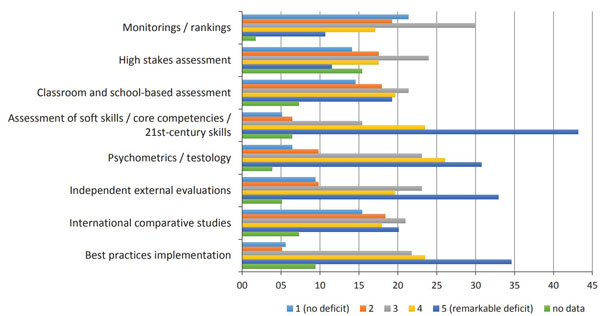
Figure 1. A general chart connecting steel, pig iron, rust, iron, and ore – and the questions, marked with numbers, about transformations between the substances
Table 2 provides further data on the distribution of scores in participants’ responses. The deficits in three professional domains were scored by respondents more than 800 points in total, which makes “Assessment of soft skills / core competencies / 21st-century skills” the most deficient professional domain among the study participants, followed by “Psychometrics / testology” and “Best practices implementation”. Appendix B provides data on response distribution by participants' countries of residence (except for the Republic of Moldova, which is the most under-represented in the study).
Table 2
Mean, average and total scores by professional practice domain|
Median score |
Average score* |
Total score |
|
|
Monitorings / rankings |
3 |
2.76 |
635 |
|
High stakes assessment |
3 |
2.94 |
582 |
|
Classroom and school-based assessment |
3 |
3.12 |
677 |
|
Assessment of soft skills / core competencies /21st-century skills |
4 |
4 |
875 |
|
Psychometrics / testology |
4 |
3.68 |
827 |
|
Independent external evaluations |
4 |
3.6 |
799 |
|
International comparative studies |
3 |
3.1 |
672 |
|
Best practices implementation |
4 |
3.84 |
815 |
Note: * excludes missing data.
As could be inferred from response distributions, the estimation of deficits was rather diverse from one country to another. “Assessment of soft skills …” was found to be the most deficient professional domain among the total sample of participants. However, only two of six national subsamples (respondents from Russia and Kyrgyzstan) provided the same conclusion. In three other subsamples (Belarusian, Kazakh and Tajik respondents) the domain of “Independent external evaluations” was established as the most deficient one. Additionally, respondents from the two subsamples (Kyrgyzstan and, to a lesser extent, Tajikistan) generally believed each of the domains to be rather deficient, scoring them 4 or 5 points, whereas in two other samples (Russia and Kazakhstan) the picture was quite opposite.
Over two-thirds of respondents answered at least one open-ended item about additional deficits (see Table 3). The study participants were exceptionally eager to propose professional areas that are deficient in their countries, although only one in five respondents proposed at least one personal professional domain to be added in the survey.
Table 3.
Open-ended items response rates.|
|
Which personal professional domains the questionnaire lacks? |
Which extra deficits might have your employer? |
Which extra deficits exist in your country? |
Which extra deficits are common for all participants of the network? |
|
Response rate, % |
19.2 |
49.1 |
50.9 |
37.2 |
Although the deficits proposed in the open-ended items were quite diverse, some patterns were discerned (see Table 4). Around 8% (n=18) of respondents mentioned insufficient numbers of qualified professionals working for their employer or in their country of residence. Other common responses included decision-making that disregards data from assessment studies (7%, n=15) and difficulties in interpreting and using such data (5%, n=12).
Table 4
Deficits suggested by the study participants|
|
Responses, n |
|
Lack of professionals |
18 |
|
Assessment-informed decision-making |
15 |
|
Interpretation and use of assessment data |
12 |
|
Developing tailored international assessment tools |
9 |
|
Assessment of teachers' competencies |
7 |
|
Assessing the quality of vocational and higher education |
6 |
|
Culture and ethics of assessment |
4 |
|
Assessment of meta-subject learning outcomes |
4 |
|
Providing assessment support to teachers |
3 |
|
Formative assessment |
3 |
Discussion
As was discussed in the beginning of the paper, the exact relationship between personal perceptions and professional practice has not yet been established by social scientists. However, it appears natural to suggest that such a relationship is likely to have a reciprocal nature.
As assumptions, beliefs, and other parts of our personality interfere with judgements in our education practice, so, similarly, it is likely that today’s education practice will leave an imprint on tomorrow’s perceptions.
The assumptions and beliefs that this study draws upon are trifold. Firstly, that the foremost objective of the professional networks is to advocate the interests of a professional community and support their standing on education practice, social or political issues. Secondly, that the networks are only successful and sustainable if they manage to detect or develop a common denominator in their participants’ practice. Lastly and consequently, that identifying and re-identifying common priorities is essential to the very existence of professional networks.
This study suggests one possible approach to such an exercise, which is to address the view of the network participants on the deficits across the domains of the professional practice. In this effort, the study advises the selected professional network about practice domains it might focus on in future years. Thus, the frequency analysis of data shows that “Assessment of soft skills” is believed to be the most deficient domain of professional practice, followed by “Best practices implementation”. Least deficient are the domains of “Monitorings / rankings” and “High stakes assessment”.
Related research might seek to employ or design more sophisticated core constructs. For the practice-related purposes of the study, the concept of educators' views about the deficits appeared to be appropriate, however, some of the feedback received in the course of the study was about the use of such constructs. This feedback corresponds to other studies that have shown the importance of language employed in educational research on educators' beliefs and assumptions (Binkley, 1997). However, the review of literature also suggests warning against an imprudent use of ambiguous constructs in the research of interactions between educators' personalities, knowledge and practice (Adoniou, 2015; Pajares, 1992).
The study was unable to correlate significant variations in participants’ responses with such factors as respondents’ employment, type of practice, or qualification, although such variation had been anticipated at the study design stage. Elaborating sampling techniques and increasing the total sample appear to be the priority measures should this design be reproduced in the future. Another measure might be adjusting the composition of practice domains suggested by the experts by including the domains suggested by respondents – such as "Assessment-informed decision-making" or "Assessment data interpretation”.
The study suggests some conclusions about the diversity of views of the network participants on their practice. The variation of responses by countries of residence implies that national contexts influence which assessment professionals believe to be deficient in their practice. It was, in fact, somewhat surprising for the network participants that knowledge-sharing might be rather impotent in compensating national differences in educational assessment. This suggests developing multiple tracks in future knowledge-sharing activities rather than prioritizing a single domain of practice.
Conclusion
The study discusses the domains of professional practice that are assumed to be the most and the least deficient by the educators in Russia and Russian-speaking countries. It reports a statistically significant connection between their estimations of professional deficits and some of the background factors, such as country of residence. The future research in this area might benefit from a thorough investigation of constructs, such as “deficits”, “deficiencies” and their alternatives, since these were an ad hoc solution that might be inappropriate to use for a study with dissimilar cultural and language context. Establishing the causal relationship between educators’ assumptions, their actual practice and background factors appears to be another under-investigated line of research.
Limitations
The study is hindered by convenience sampling approach targeted at the specific professional network. As such, the emergent data is quite unilateral in terms of participants’ backgrounds, featuring mostly Russia-based teachers and education administrators, which might impede generalizing the study results beyond its specific context.
Ethics Statement
The authors’ institutions do not require ethical approval for reporting on individual cases or case series. The informed consent was obtained from the study participants for their anonymized information to be published in this article.
Author Contributions
I.N. was responsible for designing and supervising the research project. E.L. was in charge of developing the survey, acquiring the data and designing the tables and figures. The authors contributed evenly in analyzing, interpreting and discussing the study results as well as drafting the manuscript.
Conflict of Interest
The authors declare no conflict of interest
Appendix A. The questionnaire employed by the study
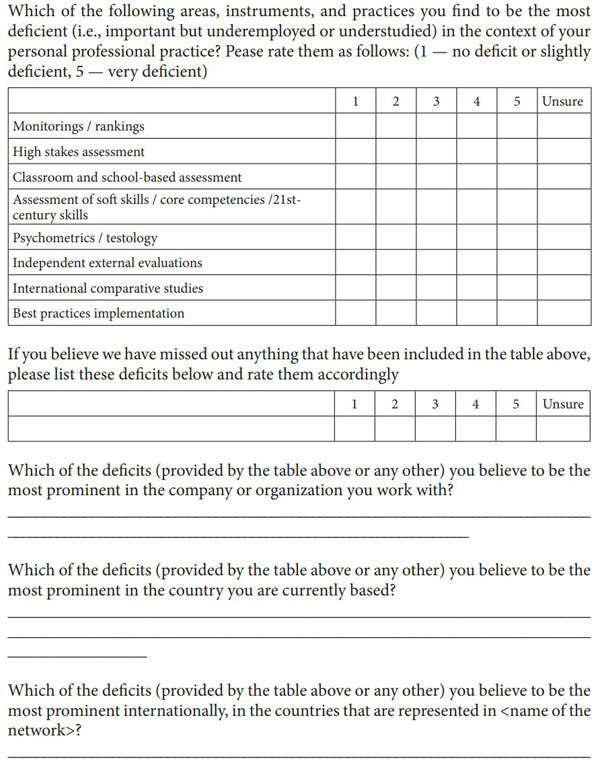
The questionnaire employed by the study. Page 1
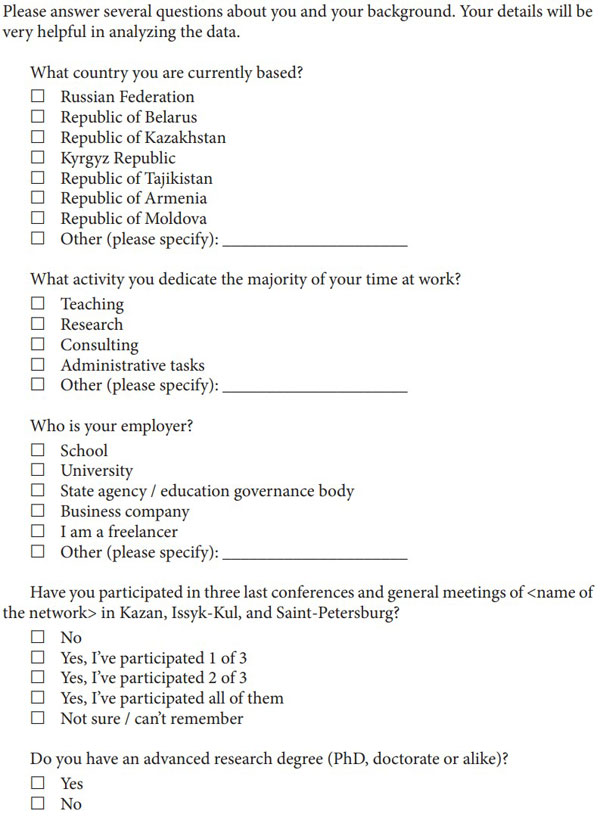
The questionnaire employed by the study. Page 2
Appendix B. Distribution of responses by country of residence
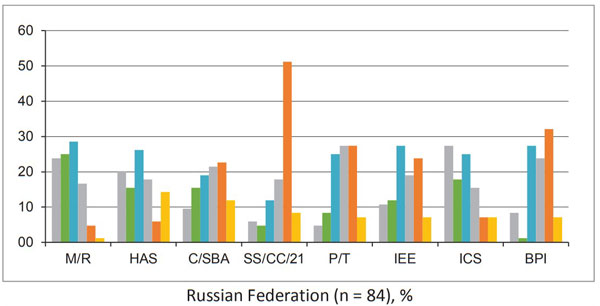
Distribution of responses by country of residence. Russian Federation (n = 84), %
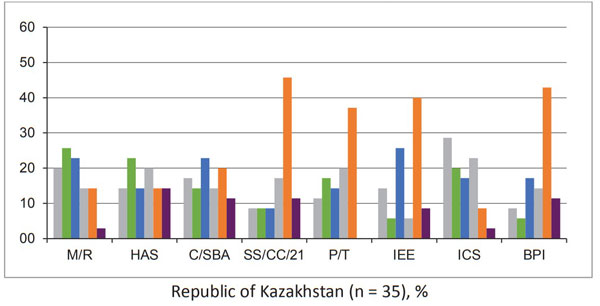
Distribution of responses by country of residence. Republic of Kazakhstan (n = 35), %
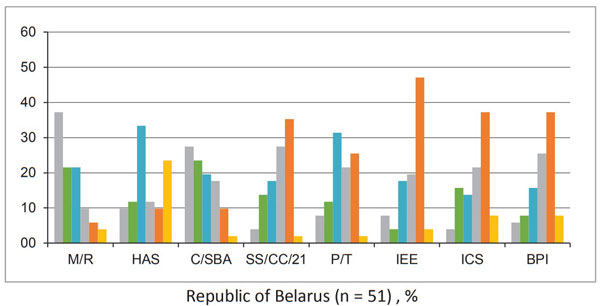
Distribution of responses by country of residence. Republic of Belarus (n = 51) , %
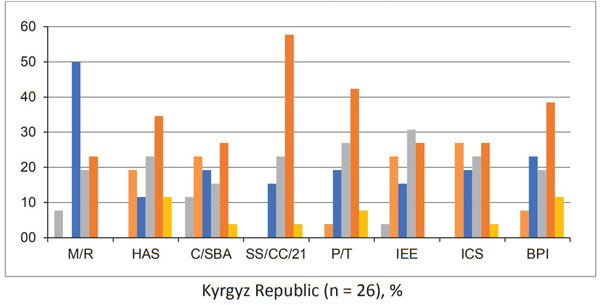
Distribution of responses by country of residence. Kyrgyz Republic (n = 26), %
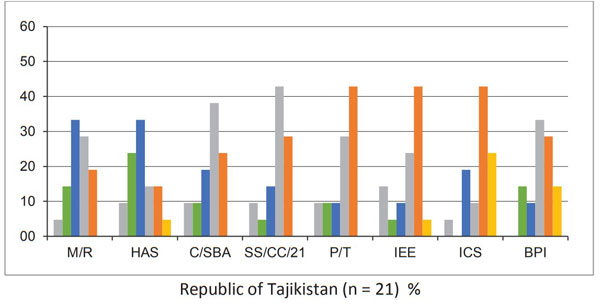
Distribution of responses by country of residence. Republic of Tajikistan (n = 21) %
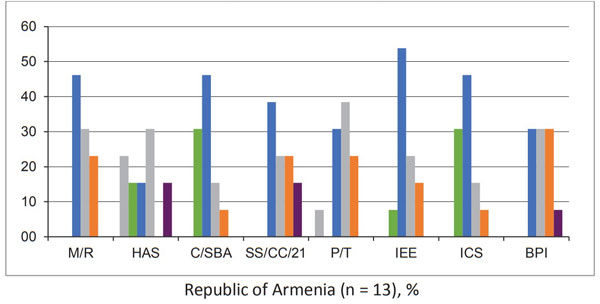
Distribution of responses by country of residence. Republic of Armenia (n = 13), %
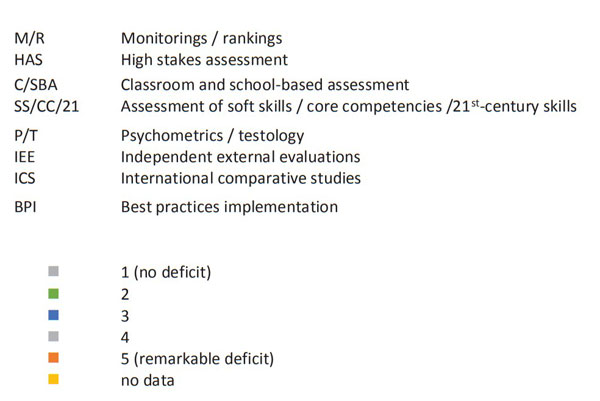
Distribution of responses by country of residence. The legend
References
Adoniou, M. (2015). Teacher knowledge: a complex tapestry. Asia-Pacific Journal of Teacher Education, 43(2), 99-116. https://doi.org/10.1080/1359866X.2014.932330
Aldridge, J.M., & Fraser, B.J. (2016). Teachers’ views of their school climate and its relationship with teacher self-efficacy and job satisfaction. Learning Environments Research, 19(2), 291-307. https://doi.org/10.1007/s10984-015-9198-x
Anghelache, V., & Benţea, C.C. (2012). Dimensions of teachers’ attitudes towards educational change. Procedia - Social and Behavioral Sciences, 33, 598-602. https://doi.org/10.1016/j.sbspro.2012.01.191
Barr, A.S., & Jones, R.E. (1958). The measurement and prediction of teacher efficiency. Review of Educational Research, 28(3), 256-264. https://doi.org/10.3102/00346543028003256
Beijaard, D., Meijer, P.C., & Verloop, N. (2004). Reconsidering research on teachers' professional identity. Teaching and Teacher Education, 20(2), 107-128. https://doi.org/10.1016/j.tate.2003.07.001
Beneke, S., & Ostrosky, M. (2009). Teachers’ views of the efficacy of incorporating the project approach into classroom practice with diverse learners. Early Childhood Research & Practice, 11.
Binkley, N. (1997). Principals’ role in policy change: Mediating language through professional beliefs. Journal of Educational Administration, 35(1), 56-73. https://doi.org/10.1108/09578239710156980
Boone, H.N., & Boone, D.A. (2012). Analyzing Likert Data. Journal of Extension, 50(2), Article 48. Retrieved from https://tigerprints.clemson.edu/joe/vol50/iss2/48
Cherry, B.D., Grasse, N., Kapla, D., & Hamel, B. (2017). Analysis of academic administrators’ attitudes: Annual evaluations and factors that improve teaching. Journal of Higher Education Policy and Management, 39(3), 296-306. https://doi.org/10.1080/1360080X.2017.1298201
Guerra, P.L., & Nelson, S.W. (2009). Changing professional practice requires changing beliefs. Phi Delta Kappan, 90(5), 354-359. https://doi.org/10.1177/003172170909000509
Joshi, A., Kale, S., Chandel, S. & Pal, D. (2015). Likert Scale: Explored and Explained. British Journal of Applied Science & Technology, 7. 396-403. https://doi.org/10.9734/BJAST/2015/14975.
Osterman, K.F., & Kottkamp, R.B. (1993). Reflective practice for educator: Improving schooling through professional development. Thousand Oaks, CA: Corwin Press Inc.
Pajares, M.F. (1992). Teachers' beliefs and educational research: Cleaning up a messy construct. Review of Educational Research, 62(3), 307-332. https://doi.org/10.3102/00346543062003307
Veenman, S. (1984). Perceived problems of beginning teachers. Review of Educational Research, 54(2), 143-178. https://doi.org/10.3102/00346543054002143


